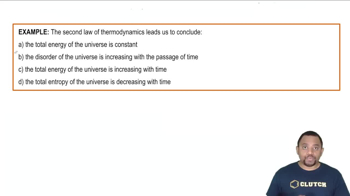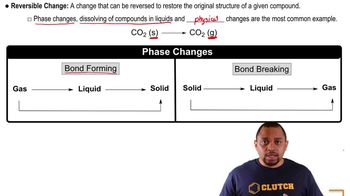Consider a process in which an ideal gas changes from state 1 to state 2 in such a way that its temperature changes from 300 K to 200 K. (c) Does the change in the internal energy, ΔE, depend on the particular pathway taken to carry out this change of state?
Ch.19 - Chemical Thermodynamics
Chapter 19, Problem 21d
Indicate whether each statement is true or false. (a) ΔS is a state function. (b) If a system undergoes a reversible change, the entropy of the universe increases. (c) If a system undergoes a reversible process, the change in entropy of the system is exactly matched by an equal and opposite change in the entropy of the surroundings. (d) If a system undergoes a reversible process, the entropy change of the system must be zero.
 Verified step by step guidance
Verified step by step guidance1
Identify the concept of a state function and recall that state functions depend only on the state of the system, not on how the system reached that state. Apply this to determine if ΔS (change in entropy) is a state function.
Understand the definition of entropy and the second law of thermodynamics, which states that the total entropy of an isolated system can never decrease over time. Use this to evaluate the statement about entropy change during a reversible change.
Recall the concept of reversible processes and how they relate to entropy. In a reversible process, the system is in thermodynamic equilibrium with its surroundings. Analyze how this affects the entropy changes in the system and its surroundings.
Understand the definition of a reversible process and its characteristics, particularly how it relates to changes in entropy. Consider whether the entropy change of the system must be zero for a process to be reversible.
Combine the knowledge of reversible processes and entropy to critically evaluate each statement and determine if it is true or false based on the principles of thermodynamics.

Verified Solution
Video duration:
3mWas this helpful?
Key Concepts
Here are the essential concepts you must grasp in order to answer the question correctly.
State Functions
State functions are properties of a system that depend only on its current state, not on the path taken to reach that state. Examples include internal energy, enthalpy, and entropy (ΔS). Understanding that ΔS is a state function means recognizing that its value is determined solely by the initial and final states of the system, regardless of the process involved.
Recommended video:
Guided course

Logarithmic Functions
Entropy and the Second Law of Thermodynamics
The second law of thermodynamics states that the total entropy of an isolated system can never decrease over time. In a reversible process, the entropy of the universe (system plus surroundings) increases, indicating that while the system may return to its original state, the overall disorder or randomness increases, reflecting the natural tendency towards equilibrium.
Recommended video:
Guided course

Second Law of Thermodynamics Example
Reversible Processes
A reversible process is an idealized process that occurs infinitely slowly, allowing the system to remain in equilibrium at all times. In such processes, the change in entropy of the system is equal in magnitude but opposite in sign to the change in entropy of the surroundings, leading to no net change in the total entropy of the universe. However, this does not imply that the entropy change of the system is zero.
Recommended video:
Guided course

Reversible Changes in Matter
Related Practice
Textbook Question
625
views
1
rank
Textbook Question
A system goes from state 1 to state 2 and back to state 1. (c) Suppose the changes in state are reversible processes. Is the work done by the system upon going from state 1 to state 2 the same or different as compared to that upon going from state 2 back to state 1?
675
views
Textbook Question
Consider a system consisting of an ice cube. (a) Under what conditions can the ice cube melt reversibly?
477
views
Open Question
Indicate whether each statement is true or false. (a) The entropy of the universe increases for any spontaneous process. (b) The entropy change of the system is equal and opposite that of the surroundings for any irreversible process. (c) The entropy of the system must increase in any spontaneous process. (d) The entropy change for an isothermal process depends on both the absolute temperature and the amount of heat reversibly transferred.
Textbook Question
The normal boiling point of Br2(l) is 58.8 °C, and its molar enthalpy of vaporization is ΔHvap = 29.6 kJ/mol. (a) When Br2(l) boils at its normal boiling point, does its entropy increase or decrease?
927
views
Textbook Question
The normal boiling point of Br2(𝑙) is 58.8 °C, and its molar enthalpy of vaporization is Δ𝐻vap=29.6 kJ/mol. (b) Calculate the value of Δ𝑆 when 1.00 mol of Br2(𝑙) is vaporized at 58.8 °C.
443
views
